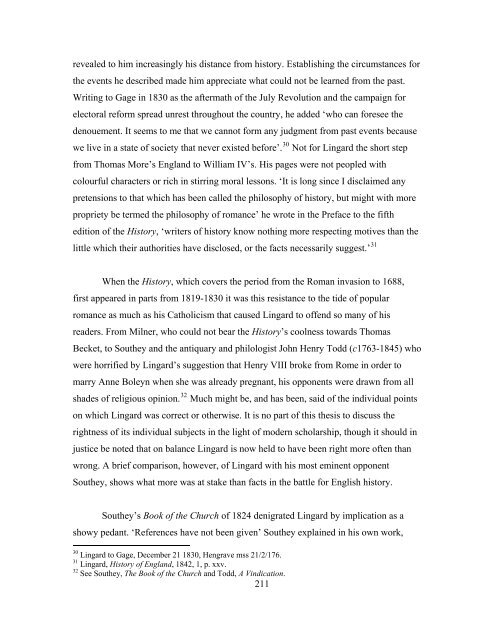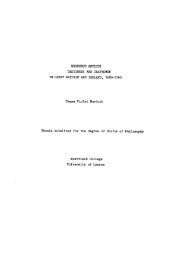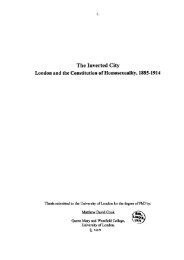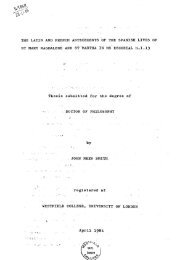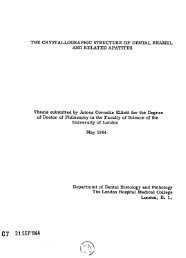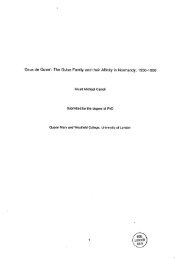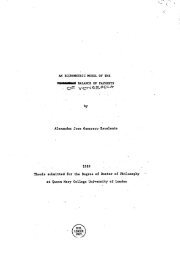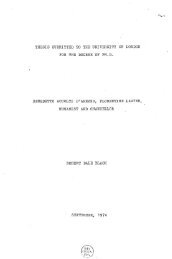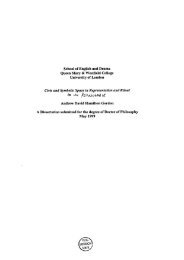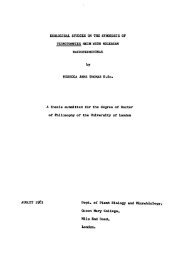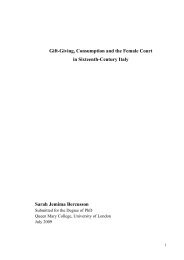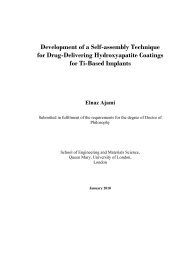Antiquaries in the Age of Romanticism: 1789-1851 - Queen Mary ...
Antiquaries in the Age of Romanticism: 1789-1851 - Queen Mary ...
Antiquaries in the Age of Romanticism: 1789-1851 - Queen Mary ...
Create successful ePaper yourself
Turn your PDF publications into a flip-book with our unique Google optimized e-Paper software.
evealed to him <strong>in</strong>creas<strong>in</strong>gly his distance from history. Establish<strong>in</strong>g <strong>the</strong> circumstances for<br />
<strong>the</strong> events he described made him appreciate what could not be learned from <strong>the</strong> past.<br />
Writ<strong>in</strong>g to Gage <strong>in</strong> 1830 as <strong>the</strong> aftermath <strong>of</strong> <strong>the</strong> July Revolution and <strong>the</strong> campaign for<br />
electoral reform spread unrest throughout <strong>the</strong> country, he added ‘who can foresee <strong>the</strong><br />
denouement. It seems to me that we cannot form any judgment from past events because<br />
we live <strong>in</strong> a state <strong>of</strong> society that never existed before’. 30 Not for L<strong>in</strong>gard <strong>the</strong> short step<br />
from Thomas More’s England to William IV’s. His pages were not peopled with<br />
colourful characters or rich <strong>in</strong> stirr<strong>in</strong>g moral lessons. ‘It is long s<strong>in</strong>ce I disclaimed any<br />
pretensions to that which has been called <strong>the</strong> philosophy <strong>of</strong> history, but might with more<br />
propriety be termed <strong>the</strong> philosophy <strong>of</strong> romance’ he wrote <strong>in</strong> <strong>the</strong> Preface to <strong>the</strong> fifth<br />
edition <strong>of</strong> <strong>the</strong> History, ‘writers <strong>of</strong> history know noth<strong>in</strong>g more respect<strong>in</strong>g motives than <strong>the</strong><br />
little which <strong>the</strong>ir authorities have disclosed, or <strong>the</strong> facts necessarily suggest.’ 31<br />
When <strong>the</strong> History, which covers <strong>the</strong> period from <strong>the</strong> Roman <strong>in</strong>vasion to 1688,<br />
first appeared <strong>in</strong> parts from 1819-1830 it was this resistance to <strong>the</strong> tide <strong>of</strong> popular<br />
romance as much as his Catholicism that caused L<strong>in</strong>gard to <strong>of</strong>fend so many <strong>of</strong> his<br />
readers. From Milner, who could not bear <strong>the</strong> History’s coolness towards Thomas<br />
Becket, to Sou<strong>the</strong>y and <strong>the</strong> antiquary and philologist John Henry Todd (c1763-1845) who<br />
were horrified by L<strong>in</strong>gard’s suggestion that Henry VIII broke from Rome <strong>in</strong> order to<br />
marry Anne Boleyn when she was already pregnant, his opponents were drawn from all<br />
shades <strong>of</strong> religious op<strong>in</strong>ion. 32 Much might be, and has been, said <strong>of</strong> <strong>the</strong> <strong>in</strong>dividual po<strong>in</strong>ts<br />
on which L<strong>in</strong>gard was correct or o<strong>the</strong>rwise. It is no part <strong>of</strong> this <strong>the</strong>sis to discuss <strong>the</strong><br />
rightness <strong>of</strong> its <strong>in</strong>dividual subjects <strong>in</strong> <strong>the</strong> light <strong>of</strong> modern scholarship, though it should <strong>in</strong><br />
justice be noted that on balance L<strong>in</strong>gard is now held to have been right more <strong>of</strong>ten than<br />
wrong. A brief comparison, however, <strong>of</strong> L<strong>in</strong>gard with his most em<strong>in</strong>ent opponent<br />
Sou<strong>the</strong>y, shows what more was at stake than facts <strong>in</strong> <strong>the</strong> battle for English history.<br />
Sou<strong>the</strong>y’s Book <strong>of</strong> <strong>the</strong> Church <strong>of</strong> 1824 denigrated L<strong>in</strong>gard by implication as a<br />
showy pedant. ‘References have not been given’ Sou<strong>the</strong>y expla<strong>in</strong>ed <strong>in</strong> his own work,<br />
30<br />
L<strong>in</strong>gard to Gage, December 21 1830, Hengrave mss 21/2/176.<br />
31<br />
L<strong>in</strong>gard, History <strong>of</strong> England, 1842, 1, p. xxv.<br />
32<br />
See Sou<strong>the</strong>y, The Book <strong>of</strong> <strong>the</strong> Church and Todd, A V<strong>in</strong>dication.<br />
211


